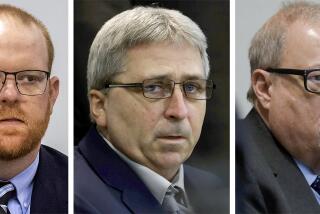In Alabama, a measure of justice for the Scottsboro Boys
FAIRHOPE, Ala. — The state of Alabama can’t rewrite a history shot through with hate and violence, but with the help of one determined woman it has added a postscript.
On Thursday, Alabama’s parole board pardoned the last of the long-dead Scottsboro Boys, nine black teenagers falsely accused of rape in 1931. Their case was monumental. It divided some residents here and united others, led to two landmark Supreme Court decisions, and precipitated the civil rights movement in the decades that followed.
All the while, though, justice remained undone for some of the boys as they became men, went into hiding, and eventually died with the stigma of rape on their reputations. That changed only after a long campaign by a Scottsboro woman.
In the mid-1970s, when Sheila Washington was 17, she found a package under her parents’ bed. She retrieved it: a pillowcase, which held something rolled in layers of plastic. She unwrapped it, and a book tumbled out.
“An old, thin paperback,” she said Thursday. A book about nine boys who were black, like her. What she read changed her life.
In the depths of the Depression, young people throughout the South hopped trains — hoboing, they called it — looking for work. That March, along the rail to Memphis, nine teenage black boys, a few white boys and two white girls had hopped on at various stops in Georgia and Tennessee.
Someone got jostled, a fight started, and the outnumbered white boys jumped off and went to the police. In Paint Rock, Ala., authorities boarded the train and arrested every black male, ranging from 13 to 19 years old. They also found the two white girls, who claimed they had been raped.
As Sheila Washington read about one of America’s greatest judicial miscarriages, her father caught her with the book. He snatched it from her hands. She heard fear in his voice. “You don’t need to know about that,” he said. “Just keep quiet about this now.”
Keep quiet: a refrain she would hear again and again, for years, about the Scottsboro Boys.
In 1978, her brother died in Kilby Prison, where the boys had been held. Guards had killed him, she said, after he had killed a white man in a fight.
These dark moments — finding the old book, her father’s fear, her brother’s death — hardened inside her as a young woman. She began work on a project on the Scottsboro Boys. A museum, a monument to their suffering. People in town expressed outrage. “They said I was disgracing the good name of Scottsboro,” she said.
After almost two decades of work she opened the Scottsboro Boys Museum and Cultural Center on Willow Street, where visitors could learn about the case out in the open, free of plastic wrap and pillowcases.
Along the way she made a realization, she said: Civil rights leaders had abandoned the boys. “After Rosa Parks, everybody shifted to her case, because it looked better and smelled better,” she said. Even after it became clear the Scottsboro Boys had committed no crime, they still lived with the stigma of rape.
Their nine trials had spanned just two days at the Scottsboro courthouse, before an all-white jury, argued by a defense lawyer who didn’t know Alabama law. All but the youngest teen received the death penalty. Afterward, the Communist Party USA intervened with legal help for an appeal, and the case eventually reached the U.S. Supreme Court, where it led to two historic decisions: that jury members cannot be systematically excluded by race, and that defendants have the right to adequate legal representation.
In 1937, one of the alleged victims recanted her story. She had never been raped. That led to five of the boys’ convictions being overturned. One of them, Clarence Norris, received a pardon in 1976.
By then, the remaining boys had died, but Sheila Washington felt they still deserved exoneration. She went before the Alabama parole board but was told there was no process for posthumous pardons.
So she approached state Sen. Arthur Orr, a white Republican whose greatest remembrance of the case, he said, came from a television special about one of the judges.
Orr was moved by Washington’s plea. “Alabama is such a different place now,” he said Thursday. “This felt like a chance to do something.”
He drew up legislation that would allow for posthumous pardons in cases of racial discrimination. The last politician to make a stand on the case — Judge James Horton had declared the men could not receive a fair trial in a court filled with a hostile mob — had been crushed in the next election. But in April, when Orr presented his bill, he said, the state legislators “were filled with a sense of unanimity, Republican and Democratic.” The law passed unanimously.
On Thursday, when the parole board granted the pardons, the gallery burst into applause. Republican Gov. Robert J. Bentley issued a statement saying, “The pardons granted to the Scottsboro Boys today are long overdue.”
John Miller, a professor at the University of Alabama, worked with Washington and Orr on the language that became law. He acknowledged that the pardon was, in a sense, symbolic. But that’s all right, he said. “Alabama has a history of being very good at political theater, but I think this is more than just theater. It’s a declaration that justice delayed doesn’t have to mean justice denied.”
Sheila Washington said the decision felt more than symbolic to her. It felt like the satisfaction of a lifetime’s work. “I believe the boys can rest now,” she said.
More to Read
Start your day right
Sign up for Essential California for news, features and recommendations from the L.A. Times and beyond in your inbox six days a week.
You may occasionally receive promotional content from the Los Angeles Times.






